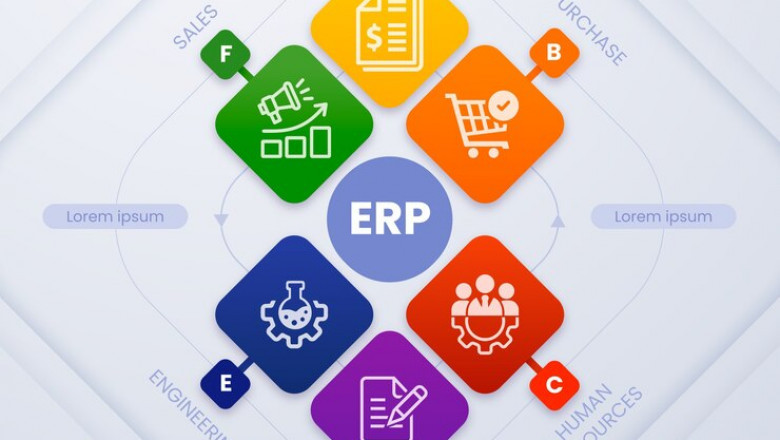views
Introduction
In the bustling business ecosystem of the United Arab Emirates, digital transformation has become an essential strategy for organizations aiming to maintain competitiveness in a rapidly evolving marketplace. Enterprise Resource Planning (ERP) solutions have emerged as critical tools that empower businesses to streamline operations, enhance decision-making capabilities, and drive sustainable growth. This comprehensive guide explores the landscape of ERP software in the UAE and highlights key providers that are shaping the future of business technology in Dubai.
ERP Software UAE: Transforming Business Operations
The United Arab Emirates has established itself as a global business hub, attracting companies from diverse industries and fostering an environment of innovation and excellence. In this dynamic landscape, ERP software has become the backbone of operational efficiency, enabling organizations to integrate various business functions into a unified system.
Regional Adaptation and Customization
ERP solutions in the UAE market are uniquely positioned to address specific regional requirements:
- Arabic language support and right-to-left interface options
- Compliance with UAE financial regulations and reporting standards
- Integration with local banking systems and payment gateways
- Support for VAT calculations and reporting
- Multi-currency functionality for international business operations
- Calendar integration supporting both Gregorian and Hijri date formats
Industry-Specific Solutions
The UAE's diverse economy has driven the development of specialized ERP systems catering to key sectors:
- Retail and e-commerce management
- Construction and real estate development
- Oil and gas operations
- Manufacturing and production
- Hospitality and tourism
- Healthcare management
- Financial services
ERP Software Companies in Dubai: Innovation Leaders
Dubai has emerged as a vibrant hub for technology providers, hosting both global ERP vendors and innovative local solution developers. These companies offer a wide spectrum of services, from implementation and customization to ongoing support and strategic consulting.
Global Players with Local Presence
Several international ERP giants have established strong operations in Dubai:
- Oracle NetSuite: Cloud-based solutions with comprehensive functionality
- SAP: Enterprise-grade systems with advanced analytics capabilities
- Microsoft Dynamics: Seamless integration with Microsoft's business ecosystem
- Sage: Specialized financial management and accounting solutions
- Odoo: Flexible, modular open-source ERP platform
Local Innovation and Expertise
Dubai's technology sector has also fostered the growth of regional ERP specialists:
- Focus Softnet: UAE-developed solutions with strong regional understanding
- Dexterity Software: Specialized in manufacturing and distribution industries
- FACTS Computer Software House: Custom solutions for Middle Eastern businesses
- Envision Enterprise Solutions: Industry-specific implementations with local support
- Tally Solutions: Popular among SMEs for financial management
Selection Criteria for UAE Businesses
When choosing an ERP provider in Dubai, organizations should consider:
- Industry expertise and domain knowledge
- Implementation methodology and timeframe
- Local support capabilities and response times
- Customization flexibility and integration options
- Arabic language support and localization features
- Compliance with UAE regulations
- Cloud vs. on-premises deployment options
- Scalability to accommodate future growth
Implementation Challenges and Best Practices
Successful ERP implementation in the UAE requires careful planning and execution:
- Clearly define business requirements and objectives
- Secure executive sponsorship and stakeholder buy-in
- Allocate sufficient resources for implementation
- Invest in comprehensive user training
- Plan for data migration and validation
- Consider cultural factors affecting change management
- Establish governance frameworks for ongoing optimization
Conclusion
ERP software continues to revolutionize business operations across the UAE, enabling organizations to achieve higher levels of efficiency, agility, and innovation. By carefully selecting from the diverse ecosystem of ERP software companies in Dubai, businesses can implement solutions that are perfectly aligned with their specific needs and objectives, positioning themselves for sustainable growth in an increasingly competitive marketplace.
Frequently Asked Questions
- What makes ERP implementation in the UAE different from other regions? UAE implementations require specific adaptations including Arabic language support, compliance with local financial regulations, VAT handling capabilities, and integration with government systems like the Federal Tax Authority portal.
- How much does it typically cost to implement an ERP system in Dubai? Costs vary widely based on business size and complexity, ranging from AED 50,000 for small business cloud solutions to several million dirhams for enterprise-wide implementations. Factors include licensing, customization, training, and ongoing support.
- Should UAE businesses choose cloud-based or on-premises ERP solutions? The decision depends on several factors including data security requirements, internet reliability, customization needs, and budget considerations. Cloud solutions offer faster deployment and lower upfront costs, while on-premises systems provide greater control over data and infrastructure.
- What are the key success factors for ERP implementation in Dubai companies? Critical success factors include strong executive sponsorship, clear project scope, realistic timeframes, adequate resource allocation, comprehensive training programs, effective change management, and choosing a vendor with local implementation expertise.
- How long does it take to implement an ERP system for a medium-sized company in the UAE? Typical implementation timeframes range from 3-6 months for cloud-based solutions with minimal customization to 9-18 months for more complex on-premises deployments with extensive customization and integration requirements.














Comments
0 comment